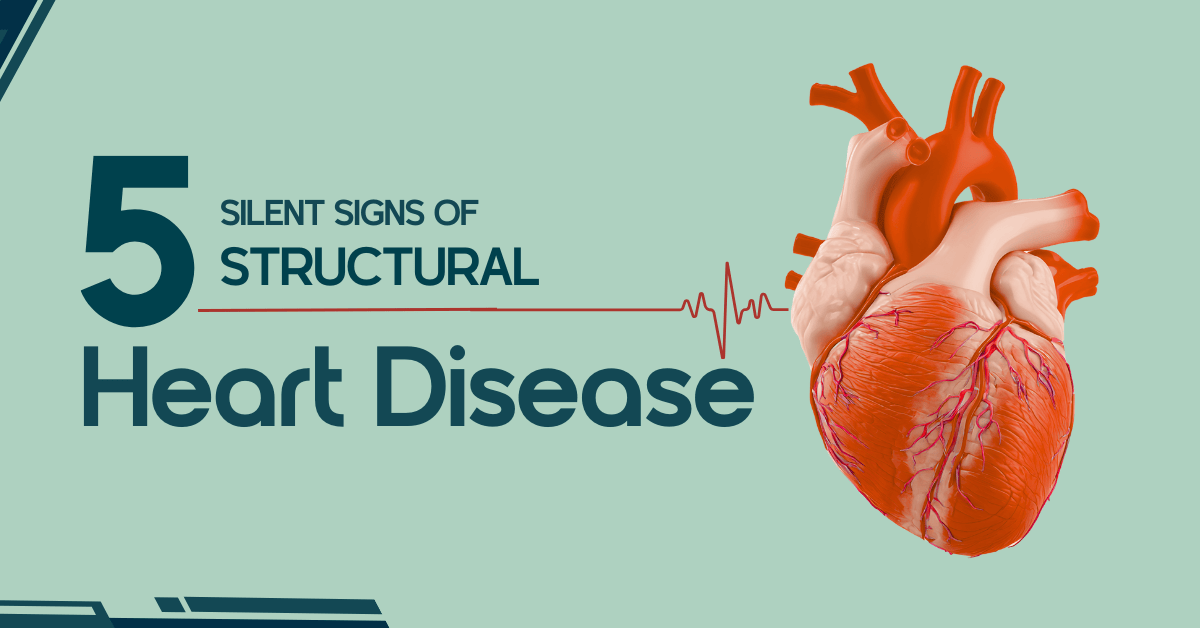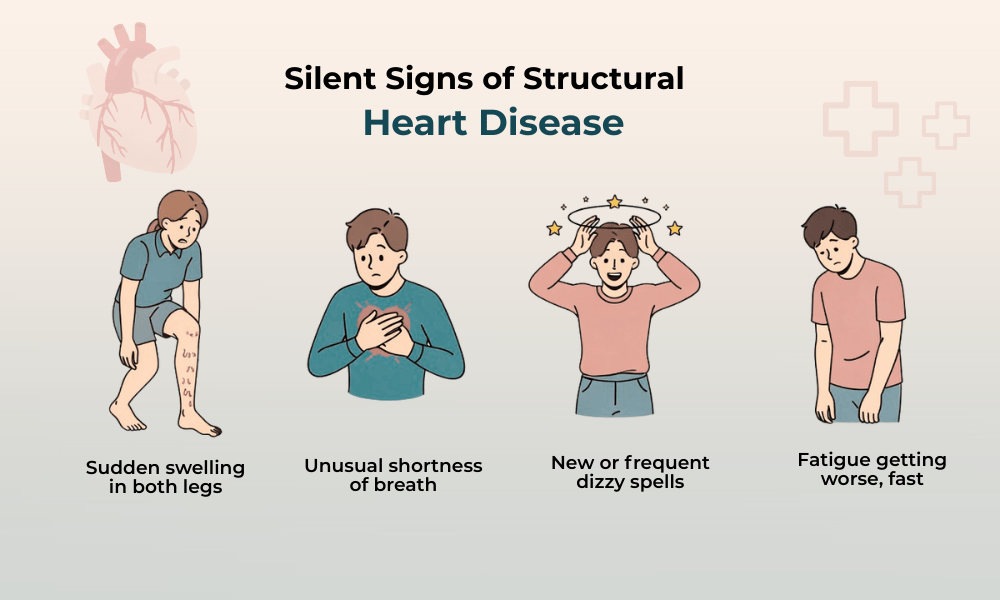5 Silent Signs of Structural Heart Disease You Should Never Ignore
Some heart problems do not begin with excruciating chest pain. In fact, many people live with symptoms for months, if not years, believing they are simply a result of aging. However, they could be signs of structural heart disease, which is characterized by damage or defects in the heart's valves, walls, or chambers.
While it may be easy to ignore these subtle cues, identifying them at an early stage can significantly impact your health. If you live in the Tampa area and haven't had a heart checkup in a long time, we'll go over five warning signs of early heart disease that could save your life below.
How Do You Know If You Have Heart Disease?
Unlike dramatic Hollywood heart attacks, the signs of structural heart disease can be so quiet they’re mistaken for aging or fatigue. You might brush off shortness of breath, tiredness, or dizziness as “just getting older” but they could point to something deeper.
While obvious symptoms like chest pain attract attention, the real warning signs are the early signs of heart disease. Here's how to spot heart problems early:
Track how often you feel tired or short of breath
Monitor your pulse after short walks, does it spike quickly or feel irregular?
Note patterns: Are symptoms lasting days, not just moments?
Keep an eye on swelling, especially in your ankles
If these things keep happening, don't ignore them. Especially in humid cities like Tampa, subtle symptoms can get worse faster. Let’s look closer at what you need to watch for.
5 Silent Symptoms of Structural Heart Disease
1. Persistent Fatigue or Weakness
Even after a restful night's sleep, feeling exhausted all the time is a warning sign. Your heart may not be pumping effectively if walking across a parking lot or climbing stairs leaves you exhausted.
This kind of fatigue from heart disease often affects women more than men and is easy to overlook. But unexplained weakness can be a sign your heart isn't delivering enough oxygen to your muscles.
2. Shortness of Breath
Dyspnea during mild exercise or even at rest is one of the most prevalent symptoms of structural heart disease. When the heart cannot pump blood effectively, fluid often builds up in the lungs.
This can feel worse and occur more quickly in Tampa due to the high levels of heat and humidity. It's time to take action if you're gasping with little effort, especially when you're lying down.
3. Swelling in Legs or Ankles
Notice your socks leaving deep marks? That could be leg swelling from heart failure, caused by fluid backing up when the heart weakens. This swelling (called edema) often shows up in the lower legs and ankles.
Pressing your finger into the swollen area is a useful at-home test. It might be more than just tired feet if it leaves a dent. Elevation can somewhat alleviate edema associated with structural heart disease, but it won't go away on its own.
4. Dizziness or Light Headedness
When you stand up, do you ever feel like the room is spinning or, worse, almost faint? Dizziness and lightheadedness brought on by heart issues may indicate that your heart isn't pumping enough blood to your brain.
This sensation may come from irregular heartbeats or low blood pressure due to valve issues. It's especially risky for older adults walking in public spaces like Tampa’s parks or sidewalks.
Tips: If you’ve fainted or felt faint more than once, don’t wait. These are early structural heart disease symptoms that need a closer look.
5. Indigestion, Nausea, or Stomach Pain
Here’s one most people don’t associate with heart issues: ongoing indigestion or nausea that doesn't improve with food changes or medication.
This silent heart symptom can mimic reflux or stomach bugs but is often reported by women with heart conditions. Stomach pain from structural heart issues usually doesn’t come with clear food triggers.
When Should I See a Provider for Silent Signs of Structural Heart Disease?
Don’t wait for a big event, early action saves hearts. If you’ve noticed 2 or more of these signs lasting longer than a week, it’s time to get checked.
Watch for red flags like:
For people in Tampa, Progressive Healthcare DPC offers quick, cheap heart checkups without the wait. Their Direct Primary Care model means longer visits and more attention, which is great for catching these small problems before they get worse.
Call Progressive Healthcare DPC today to set up a heart checkup and stay ahead of any silent symptoms.
Don’t Ignore What Your Body Is Telling You
To summarise, here are the five subtle signs of structural heart disease that you should look out for:
Fatigue or weakness that doesn’t go away
Shortness of breath, even when resting
Swollen ankles or legs
Lightheadedness or fainting spells
Indigestion or nausea without a clear cause
Finding it early is very important. These signs may not be loud, but if you don't pay attention to them, they can have a big effect.
Do you think you might be in danger? Don't wait. Make an appointment for a heart screening with Progressive Healthcare DPC in Tampa to take charge of your heart health before it's too late.
Frequently Asked Questions
-
Structural heart disease is when the heart's valves, walls, or muscles don't work right. This can happen because of age, birth defects, or normal wear and tear. If not treated, it can slow down blood flow, cause irregular rhythms, and even cause heart failure.
-
Your body adapts to the gradual changes, making symptoms like exhaustion, edema, and dyspnea feel "normal." In reality, though, your heart is having trouble keeping up.
-
Persistent swelling that dents when pressed is a common indicator of fluid accumulation brought on by a weak heart, though this isn't always the case. Get checked if you have this in addition to exhaustion or dyspnea.
-
Yes, particularly if it keeps happening. It may indicate decreased blood flow due to irregular heartbeats or problems with the valves. This symptom can be dangerous, so don't ignore it.
-
Echocardiograms, EKGs, stress tests, and blood work can all be used by physicians to identify structural heart issues. To determine what to do next, a DPC clinic such as Progressive Healthcare can begin with a straightforward in-office assessment.


